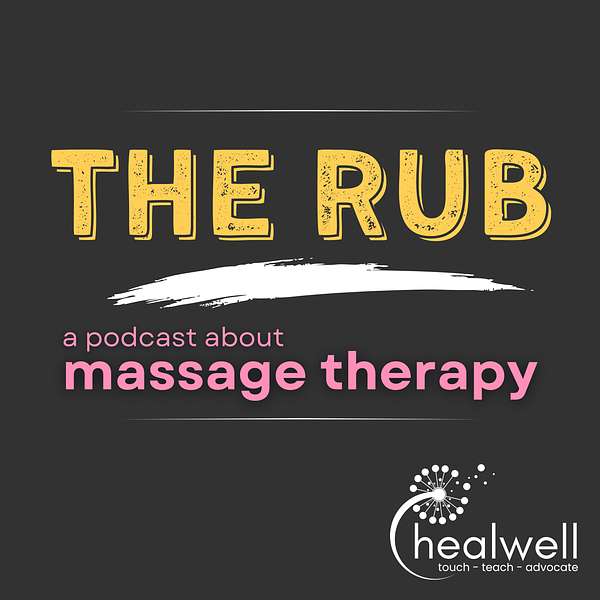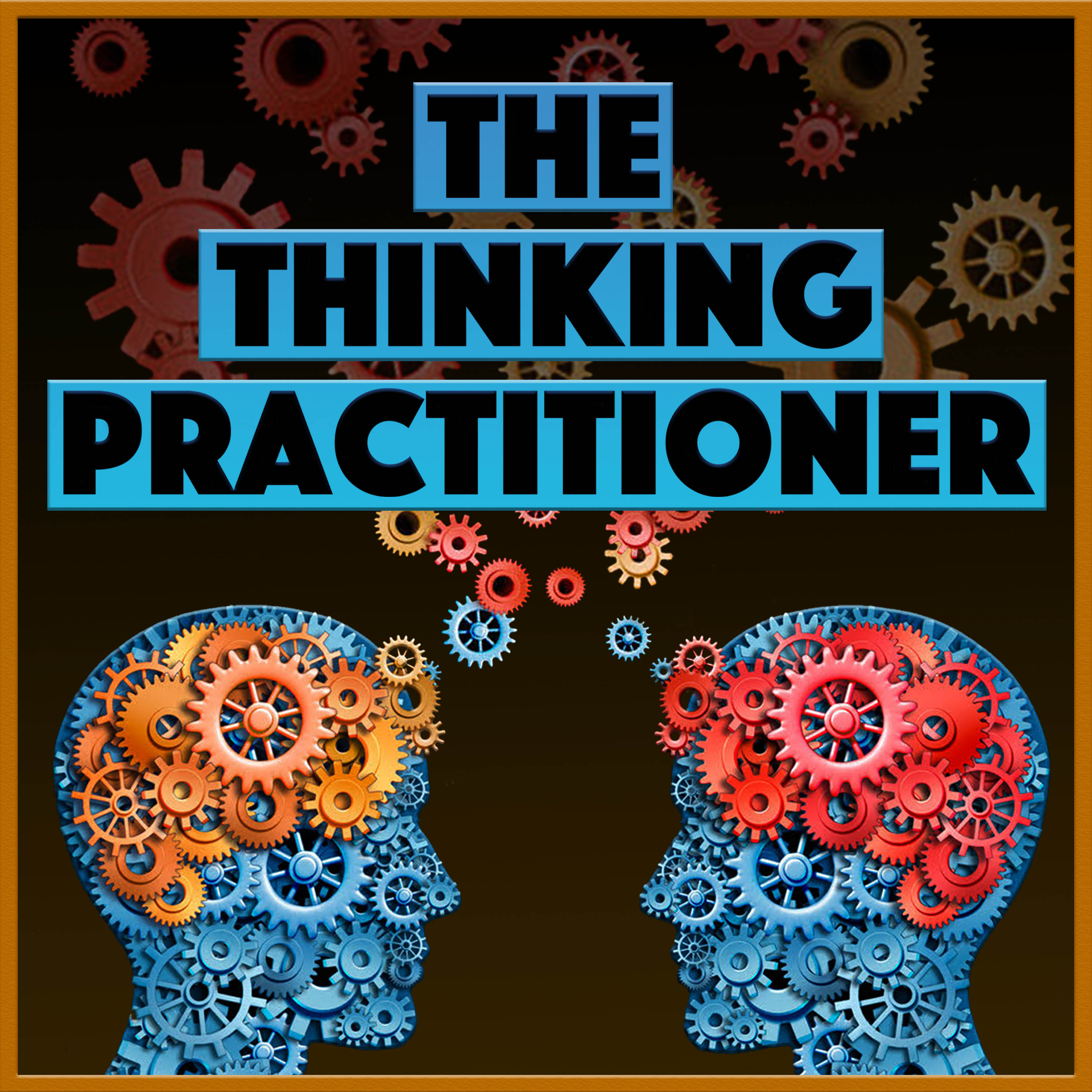
The Rub: a podcast about massage therapy
Join Healwell in examining and bringing context to the world of massage therapy beyond the table. We have ideas. We have opinions. We want change, and that will only come with an understanding of who and what massage therapy truly is. A variety of topics are up for grabs: history, philosophy, development, and all the other shiny things that fascinate us.
Healwell is a non-profit based out of the Washington DC area. Check us out at www.healwell.org
The Rub: a podcast about massage therapy
Navigating the Depth of Touch: Unveiling the World of Professional Massage Therapy
Embark on an eye-opening exploration of the often misunderstood world of massage therapy with me, Corey Rivera, your guide through the intricate landscapes of human touch. We're not only unmasking the differences between a casual massage and professional massage therapy, but also diving into why individuals across the spectrum seek out these services—ranging from celebrations on a cruise to seeking solace amid personal trauma.
This episode promises to stretch your understanding of massage therapy beyond its physical connotations, as we scrutinize the profound therapeutic relationships, the critical role of communication, and the essential education and skill of the massage therapist. We'll even touch on the delicate and often taboo topic of massage's relationship to sexuality, ensuring no stone is left unturned. Ready for a session that's as enlightening as it is provocative? Join me, and we'll navigate the societal currents and the healing power of professional touch with the curiosity and depth it deserves.
Links:
Kennedy, LMT, BCTMB, DrPH, A. B., Cambron, LMT, DC, MPH, PhD, J. A., Sharpe, PhD, MPH, LMBT, P. A., Travillian, PhD, NA-C, LMP, R. S., & Saunders, PhD, R. P. (2016). Clarifying Definitions for the Massage Therapy Profession: the Results of the Best Practices Symposium†. International Journal of Therapeutic Massage and Bodywork, 9(3), 15–26. https://doi.org/10.3822/ijtmb.v9i3.312
Subscribe to our Substack: "More Than Hands"
Send us an email: podcast@healwell.org
Leave us a voice message: 703-468-1799
Check out our interview-style podcast: Interdisciplinary
You can support Healwell and the cool things we make by donating here!
Ways join in:
- Leave us a review on Apple Podcasts
- Check out Healwell’s live and online classes
- Continue the conversation with a free 3-day trial of the Healwell Community
- Find a copy of Rebecca Sturgeon's book: "Oncology Massage: An Integrative Approach to Cancer Care"
Thank you to ABMP and AMTA for sponsoring us!
Healwell is a 501(c)(3) non-profit based out of the Washington DC area. Check us out at www.healwell.org
Welcome to the Rub a Healw ell podcast about massage therapy.
Corey Rivera:We say the quiet things loud, have a hunger for change and a desire to connect the dots. I'm your host, Corey Rivera, and in today's episode I'm going to tell you Healwe ll's views on the life-changing experience that is massage therapy. This is going to be a quick tour of some very big ideas, like the difference between massage and massage therapy and how massage therapy is more complex than you might think. It wouldn't be a Rub episode if we didn't include something at least slightly controversial, so we'll talk a little about massage and sex at the end. All of the topics I'm going to touch on today are quite large and deserve far more attention than they're going to get.
Corey Rivera:I spend a lot of my time thinking about problems from a systems perspective, which is basically a 30,000 foot view. This means, while I consider the people involved, I also consider the unspoken rules we as a society operate under. At least once a week at Healw ell, someone makes a reference to the fish being the last to notice the water. The water we humans swim in are our social norms and often we've been in them so long they've become difficult to notice and it can be incredibly challenging to imagine something new without someone else pointing out a different path. I can't tell you how much I appreciate your willingness to explore this less-traveled road with me.
Corey Rivera:The general definition of massage, according to Miriam Webster, is to rub and knead a person or part of the body with the hands. Massage is something everyone can do. It doesn't take training to put your hands on someone's shoulders and make like they're a nice lump of artesian bread dough. Oddly, it's the familiarity of that experience that makes it hard to explain the differences between massage and massage therapy. If that wasn't a big enough hurdle, massage therapy means different things to different people. Most people define massage therapy by the last experience they had with it, and that includes the layman bread dough stuff.
Corey Rivera:But let me tell you some reasons people see a massage therapist. First, the lighter reasons Because they're on a cruise, because it's their bachelorette party, because they traveled by train, plane or automobile, because their chiropractor recommended it, because their wife bought them a gift card, because they want to do athletic stuff harder, better, faster, stronger. They're stress-related reasons, because they can't sleep, because the holidays are coming up, because the holidays are here, because the holidays just passed, because massage therapy keeps them going, because massage therapy slows them down, because they're pregnant, because they just had a baby, because they have a baby and they haven't slept in days, because they need a time away from their children, because they're a caregiver. Then there are some serious health reasons Because they've been in a car accident, because they have burn scars, because they have surgical scars, because they had surgery, because they have cancer, because they had cancer, because the lymphatic system is overwhelmed, because they've been hospitalized, because they're on dialysis, because they get migraines, because they have a lot of pain and don't want to use opioids, because they clench their teeth. And then there are the deeply personal reasons Because they're depressed, because they're lonely, because someone close to them died, because they feel disconnected from their body, because they've experienced trauma, because nobody else in their lives touches them, because their massage therapist listens to them and their doctor doesn't, because they feel safe with their massage therapist, or because they've tried everything else and it didn't help. What do all these things have in common? The person experiencing them didn't go to their friend or family for a shoulder rubbin'. They went to a professional, someone they thought they could trust with their bodies and their feelings, someone who has the training and experience to take care of them in a way that they can't take care of themselves.
Corey Rivera:Massage therapy isn't just rubbing. If you want to get super academic, which I always do, there's a definition we use in research from a paper by Dr Ann Blair Kennedy. Bear with me, it has three semicolons and several commas. It says "Massage therapy consists of the application of massage and non-hands-on components, including health promotion and educational messages for self-care and health maintenance. Semicolon Therapy, as well as outcomes can be influenced by therapeutic relationships and communication. Semicolon the therapist education, skill level and experience. Semicolon and the therapeutic setting. As far as academic definitions go, this one's pretty concise, but let's break it down a little bit. Massage therapy is hands-on, but it also involves talking and feelings. Massage therapy can be for self-care or for health, both of which are very broad categories which you know from your long experience being a human. Massage therapy is more or less effective depending on a lot of factors, including the therapist's education and skill and where the massage is taking place. Its effectiveness also depends on the relationship between the massage therapist and their client.
Corey Rivera:For a long time our medical philosophies have concentrated on the physical.
Corey Rivera:We treat wounds and cure diseases. We create medications and surgical procedures to help fix people. But in all that flurry to cure and fix, we lost sight of the care part of healthcare. We separated people into pieces, a philosophy known as reductionism. This attitude is part of the western dominant medical model called European biomedicine. There are ideas that address people as a whole, particularly in palliative care. Massage therapy at its best intrinsically does this.
Corey Rivera:Massage therapy is what's known as a complex biopsychosocial intervention. Try saying that three times fast biopsychosocial, biopsychosocial, biopsychosocial. It addresses the realms of the physical or biological, the mental or psychological and the interpersonal social. Add them together and you get biopsychosocial. If that sounds heavy, don't worry, it is. Addressing a whole person is a lot more complicated than treating pieces, and there's a vast ocean between saying you want to take care of a whole person and actually pulling it off.
Corey Rivera:When people marvel at the difficulty of being a massage therapist, they often ask if our hands hurt, because that's what makes them stop rubbing someone's shoulders, and the answer is yeah, sometimes. We learn how to use our bodies to help take the strain off our hands. We find tools and techniques that might suit our style, but really there's only so much you can do with a neck that doesn't require the specificity of fingers, and if everybody you see in one day has a neck thing going on, well, that's the way the cookie crumbles. But remember, massage therapy is a complex biopsychosocial intervention. The psycho and social parts are of equal importance and the training for those is much more nebulous than learning how to palpate a bicep muscle. The physical parts of people are constant like a box of crayons, but people's internal lives are a complicated rainbow that's constantly shifting. So massage therapists need training and listening and responding. We need to understand how to emotionally regulate ourselves, because part of massage therapy is helping your client with their own emotional regulation. We need to know how to work with a person who is directly in front of us, who in all honesty might push some of our buttons. We need compassion and empathy, but having compassion is not a skill. The skill is knowing how to respond when a client suddenly tells you about a traumatic experience, and that requires training and practice. You should know that massage therapy as a profession is incredibly divided.
Corey Rivera:We've already talked on this podcast about the disagreement over how many hours an entry-level education program should be. We could also, and will eventually talk about how the profession struggles with, how massage therapy should be studied, how dangerous or safe it truly is, our scope of practice, what effects massage has on parts of the body and mind, who should be performing massage? Who should be getting massage? How much massage therapists should get paid, why people decide to be massage therapists, the best hands-on techniques, our place in healthcare, the best ways to teach massage. We don't agree on anything, and none of that addresses the institutions that make decisions for the profession or what motivations they might have for the ideas they promote. Those institutions include, but are not limited to these, seven national organizations, the massage franchises, physical therapists and chiropractors, the National Institute of Health, academia in general, and all the beliefs about medicine and health we get from European biomedicine, like the belief that massage therapy is nice to have or a luxury. This is actually really indicative of a bunch of social attitudes in America. It brushes up against our ideas about poverty and poor people, about suffering and what it means to be sick, about service work, about capitalism and about pleasure.
Corey Rivera:And speaking of when this podcast was released, apple's Podcast's algorithm immediately started recommending a podcast that is in the Not Safe for Work category. This frustrated me most because we chose to be in the health and fitness category and the algorithm completely ignored that. But you know what? We get that all the time and it's a problem, but probably not in the way you think. So I want to take a few moments to talk about that Not Safe for Work thing Before we get all serious. Here are a few of my favorite euphemisms Shagging boots, rolling in the hay, netflix and chill Hanky-Panky. Shagging, amorous Congress, the Mattress Mambo. Okay, ready? This is a problem, but I don't believe it's a moral problem, which is how it's usually framed. I am aware that this topic is a tangled web of emotion and panic.
Corey Rivera:Today, I want to talk a tiny amount about why our social system puts massage and sex in the same boat, and I'd like to be crystal clear that I am talking about consenting adults who chose their profession the same way you chose yours. This is not a discussion about trafficking or non-consensual activities of any kind. The relationship between massage and sex is a social issue because, as the descendants of Puritans, we have very rigid ideas about sex and touch and anything else remotely related to those things. Our society has ideas about jobs involving touch being bad and dirty and low. This shows up in European biomedicine in a big way, where a defining part of the medical hierarchy is how little you touch your patients. Think about it doctors touch patients less than nurses, who touch patients less than certified nursing assistants. But touch is literally vital for human survival. Remember when I said that some people see massage therapists because nobody else in their lives touches them? This is a very real problem, known as touch deprivation, touch starvation or the very vivid "skin hunger. Just hearing me say those words out loud probably made you a little upset. The idea of paying for touch is even more complicated than the need for it. We have a lot of ideas about paying people for tasks considered to be domestic or care-based, and the loudest idea is that we shouldn't pay people at all.
Corey Rivera:The massage versus sex conversation has more twists than a Sherlock Holmes story and it's just as foggy. But one thing is very clear: framing it as a moral problem is exactly what the current system wants. Moral panics prevent nearly all conversation from even starting, so the system in place will stay exactly as it is. It is the perfect defense mechanism. Here at Healwell, we prefer to face difficult conversations head-on. As Executive Director Cal Cates would say, "discomfort means you're headed in the right direction. Just stay with it. If you take nothing else away from this episode, please take this. Sex workers are not the enemy of massage therapists. Sex work is work, and the people who do that work deserve the same protections as everyone else. They deserve safe work environments, they deserve not to be harassed, they deserve agency and choice, and the topic of massage and sex deserves careful, calm, thoughtful and thorough consideration.
Corey Rivera:I'm going to end this episode the way I began it, with a tasty food metaphor. This episode is like the flaky outside layer of a giant onion. We're going to give this onion all the respect it deserves, but that vegetable is going to get peeled. There may be irritation and there may be tears. I might slice it too fine or too thick, and there's a good chance my cutting board is too small, but we'll make it to the core together and then we'll plant it and grow new onions. And now I'm getting carried away, so I'll stop there. If any topic in this episode jumped out at you is something you want to know more about, please send an email to podcast@h ealwell. Healwellorg. There's a lot to cover, and knowing what you're interested in will help focus my magpie tendencies. If these are topics you want to talk about with other people, you should join us in the Healwell Online community at community. healwell. org. We're excited to meet you and thank you for listening.
Podcasts we love
Check out these other fine podcasts recommended by us, not an algorithm.

Interdisciplinary
Healwell
Maintenance Phase
Aubrey Gordon & Michael Hobbes
You're Wrong About
Sarah Marshall
The Rest Room
Natasha Lipman
The ABMP Podcast | Speaking With the Massage & Bodywork Profession
Associated Bodywork & Massage Professionals
Research Perch
Massage Therapy Foundation
Unexplainable
Vox
The Words Matter Podcast with Oliver Thomson
Oliver Thomson
The Thinking Practitioner
Til Luchau & Whitney Lowe
Collaborative Connections Podcast | Conversations on Cancer Care for Oncology Massage Therapists & Estheticians
Society for Oncology Massage & Esthetics

